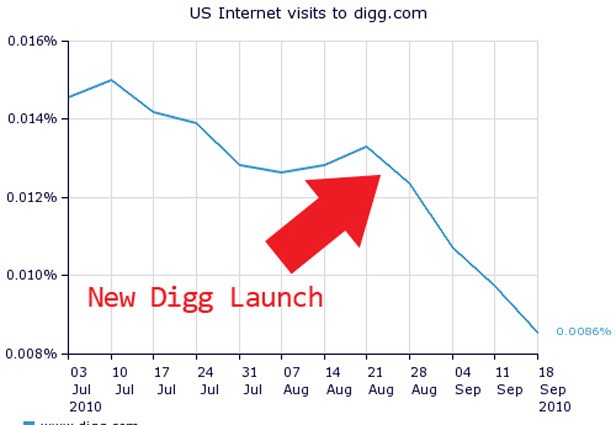If I told you there was a time when Reddit didn’t rule the front page of the Internet, you’d probably shake your head in disbelief. Even harder to believe, is that its predecessor, Digg, was set up for similar success long before internet domination was a twinkle in Alexis Ohanian’s keen eye.
Founded by Kevin Rose and Jay Adelson in 2004, Digg got its start as a community-based news aggregator funded solely at first with a meager $6,000 from Rose’s pocket. Back then, he was known for working as a Screen Savers anchor and lurking SlashDot when he spawned the idea for Digg. “SlashDot was one of my daily news sources,” Rose has previously confessed. “Users would come in and submit stories. I wanted to see what would happen if the users could vote on the stories and determine which ones went on the front page.”
Why is it called Digg?
Rose believed that people turned to Digg in an attempt to have some semblance of control over which of the endless headlines would be considered news. Much like the initial concept, the name came naturally. “I remember thinking, ‘Okay, these links are buried beneath the surface and people are going to go in and they’re going to vote on them and they’re going to “dig” them up,’” he admitted in Digg: Five Years in Five Minutes.
Acquiring the name was unfortunately less easy, since dig.com was already owned by Disney Interactive Group at the time. He knew without question that DIG wasn’t likely to hand over the domain, so instead he got creative. He tacked on another g and went to work. By curating content from all over the web, Digg gave its users the power to digg up links that proved important to the community (Sound familiar yet?).
SEE ALSO: Why is reddit Called reddit?
For the first few years, the website thrived on this appeal alone. According to Mashable, the Digg team received $2.5 million in funding in 2006, enabling them to expand their arsenal to include science, entertainment and business along side technology. As the company grew, they continued to offer their fans new features. They introduced the DiggBar in April 2009, hoping to lure leaving eyes back with a small bar that lived on pages viewed through Digg, so users could digg or bury more conveniently. The community, however, found it more invasive than helpful, and voiced their opinions. The same year, the introduction of diggable advertisements pushed fans further away.
Image Credit: Mashable
Though the features could have been enough to turn readers off, they certainly weren’t the only challenge the startup faced in its boom. In 2007, Digg was confronted with unforeseen censorship concerns when an article containing an HD-DVD Key was leaked and dug up. Digg eventually received a legal letter requesting they pull the post and when they did, their users went up in arms. To prove their point, diggers responded by submitting a new article with the key in the title once every two seconds. The moment served as a turning point for the team, who decided then they’d rather fight the legal action than their loyal community.
In 2010, Rose took the CEO position back from Adelson. His first order of business was to remove the renowned DiggBar and deliver a new user interface. But regardless of the excitement that surrounded its release, the efforts turned out to be fruitless. Once faithful fans gave up their a-digg-tion and continued their exodus to other sharing sites, like the increasingly popular reddit, Digg was buried.
By 2012, Digg was still slowly fading from internet fame. In an effort to save it, Betaworks acquired the site for a rumored $500,000 and focused on yet another redesign. They took what was left and ran with it, writing on the native blog, “Because of the six-week deadline, we had to scrap all the community features. We felt we should shelve those features until we had more time to figure it out.”
Today, they seem to have found some success. Their 2015 Digg By The Numbers reports growth and new tools like Digg Reader and Digg Deeper. Despite the rollercoaster the startup has seen, its mission has stayed steady. Still they claim, “The Internet is both wonderful and often utterly overwhelming — an endless scroll of stories, videos, blog posts (e.g., the one you’re reading), tweets, status updates, infographics, shared photos, gifs, alerts, and so on. Digg’s mission is to make sense of it all, to distill that vast daily river down to its most interesting and noteworthy gems.” The company is currently CEO’d by John Borthwick and is headquartered in New York City.
Do you digg?
Thanks for reading Why is Digg called Digg! What news aggregator sites do you find most entertaining and useful? #whyisitcalledDigg
Annelise Schoups is a contributor at Rewind & Capture. With a degree in journalism, experience in public relations, and an education in travel, she is passionate about cultivating knowledge and storytelling.







Leave a Reply